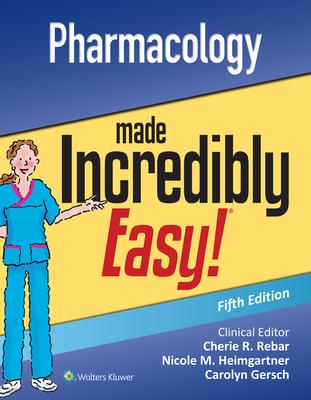- NEW chapters on patient education, sensory drugs, and dermatologic drugs
- NEW chapter on medication safety, including abbreviations to avoid and a review of dosage calculations
- NEW content on current approved medications, and dosages, and expected versus adverse effects
- NEW content on emergency drugs, herbs/supplements, immunization schedule, and more
- Hundreds of colorful diagrams, drawings, and charts that illustrate core concepts, with easy-to-retain definitions and clear direction on administering drugs; drug distribution, absorption, and metabolism; drug classes and their uses; and potential drug interactions
- Quick-scan outline format offers up-to-date guidance on areas including:
- Nursing pharmacology fundamentals
- Concepts of pharmacokinetics, pharmacodynamics, and pharmacotherapeutics
- Pain drugs, autonomic nervous system drugs, neurologic and neuromuscular drugs
- Psychotherapeutic, anti-infective, anti-inflammatory, anti-allergy, and immunosuppressant drugs
- Antineoplastic drugs, drugs for fluid and electrolyte balance
- Ways a drug may affect patients of different ages and other warnings
- Content reflects the NCSBN Clinical Judgment Measurement Model - guidance from initial assessment to evaluating outcomes
- "Practice Makes Perfect" end-of-book practice exam - approximately 100 new NCLEX(R)-style questions, to increase your exam confidence
- Chapter features include:
- Prototype pro - Actions, indications, and nursing considerations for common prototype drugs
- A three-step process is provided throughout the chapters to help you care for individuals taking commonly prescribed medications
- Pharm function - Explains and illustrates how drugs act in the body, and addresses how to recognize and treat adverse reactions
- Before you give that drug - Warnings to consider before you administer a drug
- Education edge - Information to share with your patient
- Black Box Warnings boxes draw attention to life-threatening concerns
- Lifespan Lightbulb boxes highlight information about how a drug or drug class may affect patients of different ages
- Quick quiz - End-of-chapter questions with answers/explanations, to help you remember the essentials
- Nurse Joy and Jake illustrated characters offer tips and insights throughout
Nicole Heimgartner, DNP, MSN, RN, CNE, CNECI, COI, is a Nursing Faculty member at Galen College of Nursing in Louisville, Kentucky
Carolyn Gersch, PhD, MSN, RN, CNE, is a Professor of Practice in the Nursing Program at Wittenberg University in Springfield, Ohio
